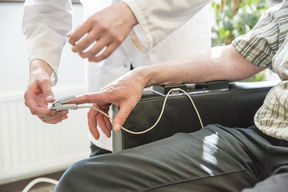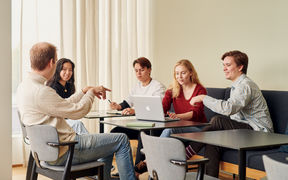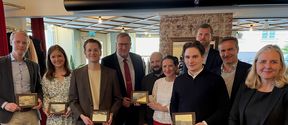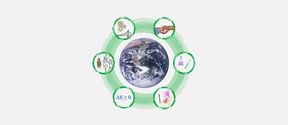How do millennials see the future of social welfare and healthcare services?

A lot is happening in Finnish social welfare and healthcare at the moment. One of the most topical issues is the digitalisation of social welfare and healthcare services, where there is still plenty of untapped potential. The need for and use of e-services, however, is growing rapidly. Can digitalisation of services and emphasis on self-care help towards solving the different challenges faced in primary healthcare?
Getting familiar with primary healthcare
Deloitte commissioned from the students a project work in which the goal was to get familiar with the field of Finnish primary healthcare and identify potential areas for development particularly in the digitalisation of customer services and self-care services. Students Iiro Hakala and Vivi Mauno took on the task.Iiro is a finance student at the School of Business who is also studying law at the University of Lapland. Vivi, meanwhile, is studying information and service management at the School of Business and health economics at the University of Oslo. Markku Tinnilä, Senior University Lecturer in Logistics, acted as the academic advisor for the project work.
There are a number of factors affecting Finland's social welfare and healthcare operating environment. The population is ageing and the number of elderly people will increase considerably over the next ten years. The shortage of skilled labour is already visible in many localities, and the competition to secure the available workers in several areas of social welfare and healthcare is getting stronger. It is difficult, for example, to get health centre physicians on permanent contracts. At the same time, demand for social welfare and healthcare services is increasing. Furthermore, shrinking local government funding also brings its own challenges.
The potential benefits of digitalisation are large
The students interviewed healthcare representatives and experts in digitalisation from outside the healthcare field. All the interviewees saw great potential for benefiting from digitalisation. According to one estimate, for example, around one third of primary healthcare visits could be handled digitally. This in turn would enable more efficient use of personnel resources and savings, for example, in the cost of premises.
Motivation for digitalising services is also strong, and it is considered the only possible solution as demand increases and resources decrease. The desire is to get all the potential benefits from digitalisation, but with the current service production model this is not possible. Service design plays a large part in this, and models from outside the sector can be applied.
Interviewees identified the challenges as being the multi-channel service structure, fragmented systems and the rigidity of legislation.
How will digitalisation change healthcare in the coming years?
Mental health services, digital symptom assessment and services for the elderly were selected for closer assessment in the advanced section of the project.
According to previous studies, online preventive and early intervention measures in mental health services bring significant cost benefits. Such digital solutions can achieve cost savings of up to 30% throughout the value chain. The potential for cost savings is also significant in digital symptom assessment. Such assessments can be used for data collection, patients’ self-diagnosis of symptoms, and assessing levels of urgency.
Digital solutions also offer increased security for older people in everyday life, increased peace of mind for those close to them, and cost savings for society as a whole. For example, up to a quarter of falls among the elderly can be avoided through the use of different safety technologies.
It is time to move into the new decade
In their conclusions, the students affirm that the situation in primary healthcare still requires the development of digital tools. Although many successful experiments and pilots have been carried out in healthcare, the development of digital services is very fragmented. In addition, there have not been many cases of extensive digital service implementations.
At the technical level, however, many digital solutions already exist and are also easily applicable to a wide range of services. Good service design can also be applied to introduce these services to more vulnerable population groups.
Many digital solutions suitable for healthcare are already in use in other sectors, such as banking or insurance. The healthcare sector is still lagging behind though – and in some cases is like ‘travelling back to the 80s’.
Lauri Salmivalli, Deloitte’s Government and Public Services Industry Leader in Finland, is very happy with the collaboration with Aalto University.
‘The collaboration was smooth and the approach very customer oriented from the beginning. We got a good and fresh view on the digitalisation and development of the social and health care services.’
Customized Student Business Projects
Contact us when you need bright minds to analyse and solve your challenges. We will tailor a student project according to your needs.

- Published:
- Updated:
Read more news

Towards the transition from the academic world to the professional world
Accounting Masters students had the opportunity to tackle real-life business challenges in the CAPSTONE course in accounting
Civil Engineering invites companies to participate in future development work
A stakeholder event organized by the Department of Civil Engineering has already become a spring tradition. Civil Engineering Day was held on April 25 in Dipoli Otaniemi.
Seed funding available to boost collaboration between Aalto, KU Leuven and University of Helsinki
Aalto University, KU Leuven and the University of Helsinki launch the 2nd exploratory seed funding call to explore research collaboration possibilities. The funding call is open until 10 September 2024.